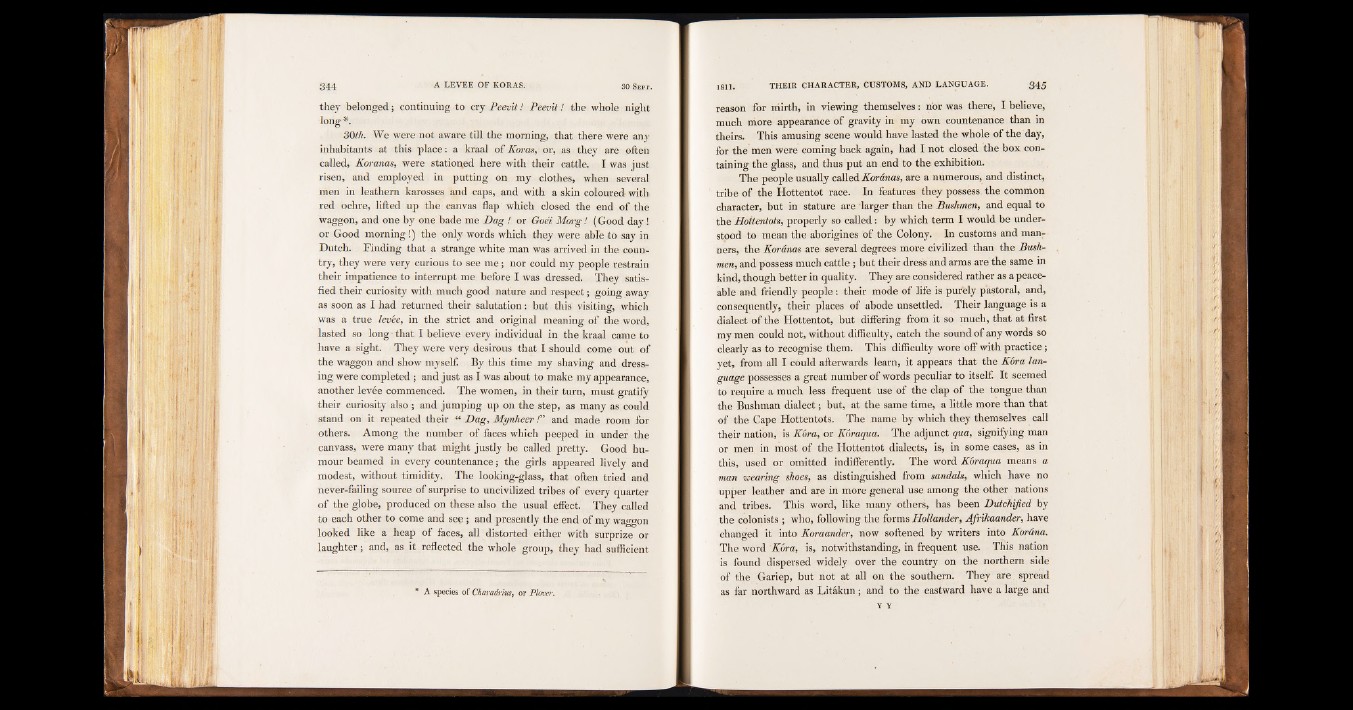
they belonged; continuing to cry Peevit ! Peevit ! the whole night
long*.
30th. We were not aware till the morning, that there were any
inhabitants at this place: a kraal of Karas, or, as they are often
called, Koranas, were stationed here with their cattle. I was just
risen, and employed in putting on my clothes, when several
men in leathern karosses and caps, and with a skin coloured with
red ochre, lifted up the canvas flap which closed the end of the
waggon, and one by one bade me Dag ! or Goei Morg ! (Good day !
or Good morning !) the only words which they were able to say in
Dutch. Finding that a strange white man was arrived in the country,
they were very curious to see me ; nor could my people restrain
their impatience to interrupt me before I was dressed. They satisfied
their curiosity with much good nature and respect ; going away
as soon as I had returned their salutation : but this visiting, which
was a true levée, in the strict and original meaning of the word,
lasted so long that I believe every individual in the kraal came to
have a sight. They were very desirous that I should come out of
the waggon and show myself By this time my shaving and dressing
were completed ; and just as I was about to make my appearance,
another levée commenced. The women, in their turn, must gratify
their curiosity also ; and jumping up on the step, as many as could
stand on it repeated their “ Dag, Mynheer !" and made room for
others. Among the number of faces which peeped in under the
canvass, were many that might justly be called pretty. Good humour
beamed in every countenance ; the girls appeared lively and
modest, without timidity, The looking-glass, that often tried and
never-failing source of surprise to uncivilized tribes of every quarter
of the globe, produced on these also the usual effect. They called
to each other to come and see ; and presently the end of my waggon
looked like a heap of faces, all distorted either with surprize or
laughter ; and, as it reflected the whole group, they had sufficient
* A species of Charadrius, or Plover.
reason for mirth, in viewing themselves: nor was there, I believe,
much more appearance of gravity in my own countenance than in
theirs. This amusing scene would have lasted the whole of the day,
for the men were coming back again, had I not closed the box containing
the glass, and thus put an end to the exhibition.
The people usually called Koránas, are a numerous, and distinct,
tribe of the Hottentot race. In features they possess the common
character, but in stature are ’larger than the Bushmen, and equal to
the Hottentots, properly so called: by which term I would be understood
to mean the aborigines of the Colony. In customs and manners,
the Koránas are several degrees more civilized than the Bushmen,
and possess much cattle ; but their dress and arms are the same in
kind, though better in quality. They áre considered rather as a peaceable
and friendly people : their mode of life is purely pastoral, and,
consequently, their places of abode unsettled. Their language is a
dialect of the Hottentot, but differing from it so much, that at first
my men could not, without difficulty, catch the sound of any words so
clearly a3 to recognise them. This difficulty wore off with practice;
yet, from all I could afterwards learn, it appears that the Kóra language
possesses a great number of words peculiar to itself. It seemed
to require a much less frequent use of the clap of the tongue than
the Bushman dialect; but, at the same time, a little more than that
of the Cape Hottentots. The name by which they themselves call
their nation, is Kara, or Kóraqua. The adjunct qua, signifying man
or men in most of the Hottentot dialects, is, in some cases, as in
this, used or omitted indifferently. The word Kóraqua means a
man wearing shoes, as distinguished from sandals, which have no
upper leather and are in more general use among the other nations
and tribes. This word, like many others, has been Dutchified by
the colonists ; who, following the forms Hollander, Afrikaander, have
changed it into Koraander, now softened by writers into Korána.
The word Kóra, is, notwithstanding, in frequent use. This nation
is found dispersed widely over the country on the northern side
of the Gariep, but not at all on the southern. They are spread
as far northward as Litakun; and to the eastward have a large and